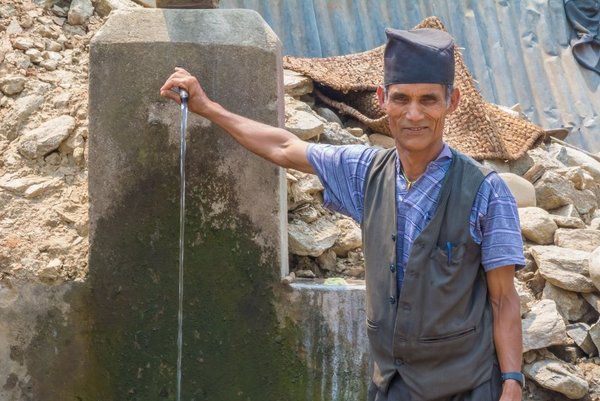 Read this article in French
Read this article in French- Share this article
- Subscribe to our newsletter
More than Flow: The WISE Scales Measure Water Users’ Experiences
The answer is yes, says the Swiss development organisation Helvetas in a recent press release. While numerous indicators focus on the accessibility and functionality of water infrastructure, no measurement used to exist to quantify people’s experiences of water insecurity at the household and individual level in low- and middle-income countries.
According to Helvetas, the Water Insecurity Experiences (WISE) Scales were created to fill this gap by a collaboration of 50 cross-disciplinary scholars and practitioners, led by Northwestern University in Illinois, USA. To date, the scales have been implemented in at least 60 countries by more than 100 organisations, including Helvetas.
The household-focused version of the scale, HWISE, includes twelve simply phrased questions that take 3-5 minutes to administer. The HWISE Scale asks respondents to reflect on experiences of water availability, accessibility, use, acceptability and reliability throughout the prior four weeks.
For example, in the last four weeks, have they been unable to wash their clothes because of an inadequate water supply? The scale also considers the emotional toll that accompanies water insecurity, such as worry and shame. The results are revealing gender, age and education disparities in water access and use that have long been obscured by traditional monitoring practices.
Applying the HWISE in Nepal
Helvetas is piloting the use of the HWISE Scale in the Karnali Province in Nepal, an area where the organisation has implemented water infrastructure improvement projects for almost 50 years, to monitor people’s experiences before and after water service interventions.
In a 2021 HWISE survey, 18 per cent of respondents reported feeling water insecure. That same year, with the support of charity: water, Helvetas partnered with local actors to install household water connections in over 5,500 households. In the follow-up survey in 2022, less than three per cent of respondents were water insecure.
The initial data results show a significant decrease in people’s experiences of water insecurity after receiving household connections. In particular, there was a marked decrease in reports of feeling angry about the water service, feeling worried about not having enough water, and experiencing interruptions or a limited water supply.
Helvetas plans to collaborate with Northwestern University and the University of North Carolina at Chapel Hill/USA to research the Nepal programme’s use of the HWISE Scale. The scale is also being piloted as part of a baseline survey of 50 villages in Madagascar that will be connected to water service through charity: water’s support.
Adapting the scales for schools and health centres
Although implementation of the scales is widespread, they were not designed for institutions, and so far have focused on increasing understanding of water insecurity at the individual and household level. Helvetas is collaborating with the Swiss Water and Sanitation Consortium (SWSC) and Northwestern University to adapt the scales for use in evaluating experiences of those working in and receiving services from schools and healthcare facilities.
The eight members of the SWSC will begin work on a fourth project phase (2023-2027) in July in over 250 schools and 150 healthcare facilities in eleven countries, most of which are in rural locations. Northwestern University, with the support of Helvetas USA and SWSC, will lead the development of scales that can be used in schools to measure the perceptions and experiences about water, sanitation, hand hygiene and waste. SWSC members will also support testing with teachers, students and parents in schools and clinical and non-clinical staff in health centres.
(Helvetas/wi)
More information:
Northwestern Institute for Policy Research: What do the WISE Scales Measure?
Household Water Insecurity Experiences Scale User Manual
Helvetas’ water infrastructure improvement projects





Add a comment
Be the First to Comment